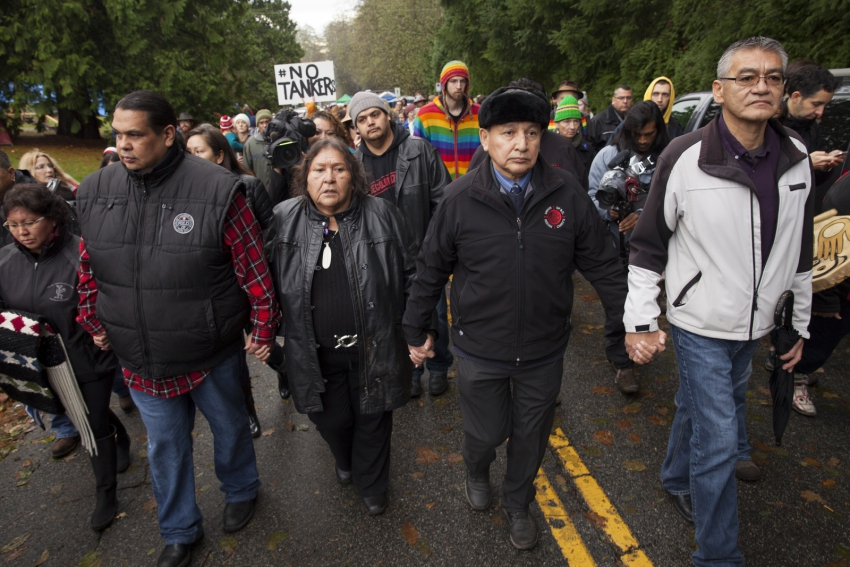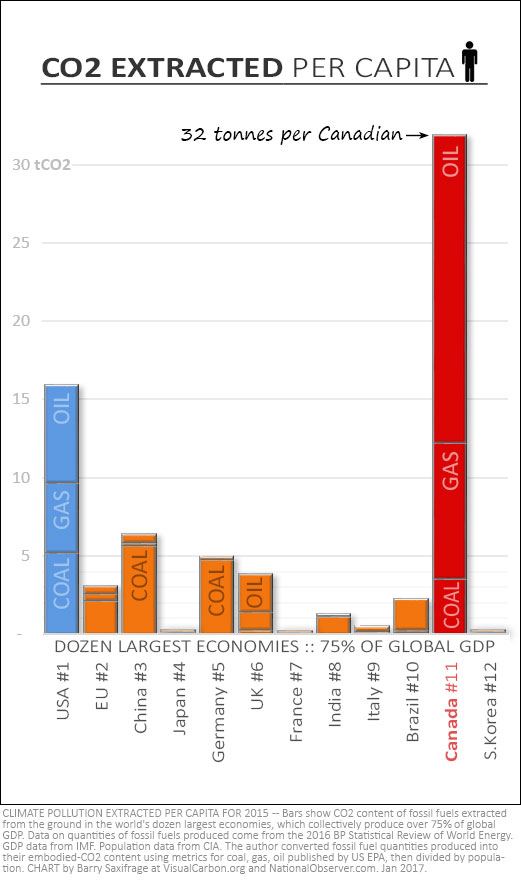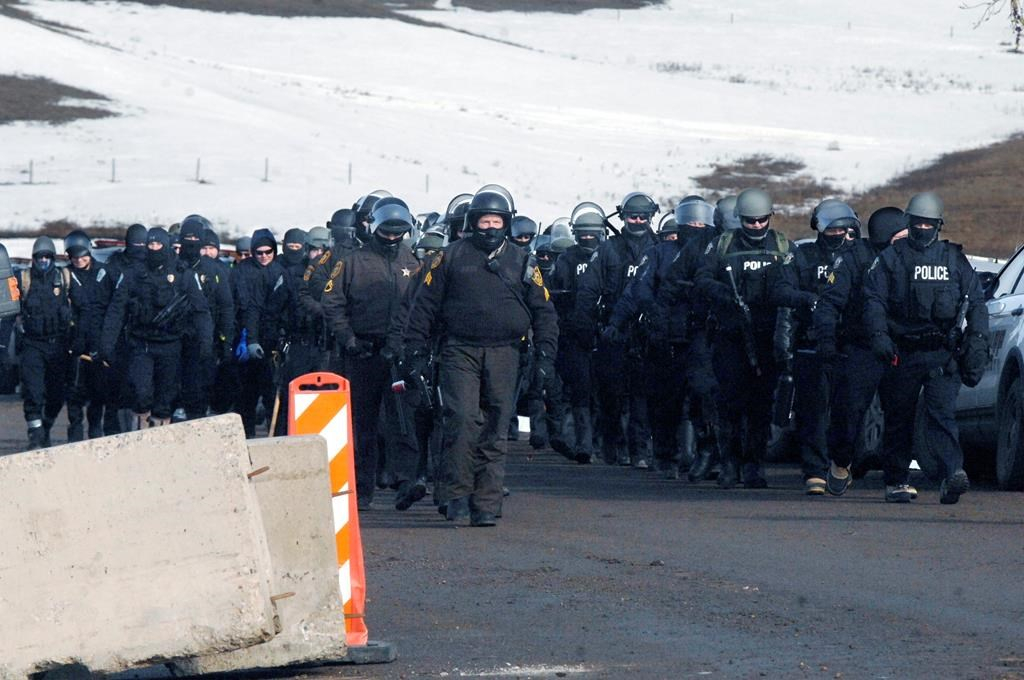Support strong Canadian climate journalism for 2025
Tsleil-Waututh elder Amy George was keening at the shore of an oil sands tailings site in the summer of 2013. Her raw honesty over the devastation of land, culture and “Mother Earth” left an indelible impression on the 500 of us gathered for the Healing Walk in Northern Alberta.
Those memories of Amy George weeping amidst the booming echoes of Syncrude’s noise cannons came flooding back as the National Guard cleared out the water protectors standing against the Dakota Access pipeline this week.
Militarized police and the military itself advancing on Indigenous people protecting their traditional land. Is this now the face of the oil industry in North America? It’s a face brutally familiar to people in other parts of the world. In Nigeria, for example, or Ecuador, or any number of countries where big oil companies don’t have to worry much about public relations and have the backing of military forces to extract fossil fuels.
Are the Standing Rock images a preview of what we can expect in Canada when construction begins on Kinder Morgan’s pipeline expansion to Vancouver harbour? We’ve already seen what happened when the pipeline company conducted some surveying on Burnaby Mountain.

First Nations leaders and over 100 others were arrested in the course of a few days. Amy George was among those arrested alongside Grand Chief Stewart Philip from the Union of B.C. Indian Chiefs. And that was in protest over a surveying operation. Just imagine the likely response if the company really starts construction on the new pipeline. Let us hope that nothing so extreme ever happens here.
First Nations from across North America are already organizing with environmental activists, apparently preparing for a showdown over Kinder Morgan. Bill McKibben, author and founder of 350.org is heading to Vancouver to offer support to the Tsleil-Waututh and other First Nations.
National Observer had a chance to interview McKibben on a range of topics this week and he was crystal clear that activists are going to double down on pipeline battles as a major strategy in the age of Trump.
“Keep up the fight against pipelines,” McKibben emphasized. “… support for indigenous communities may be our best hope at times like this.”
The Trudeau government has been banking on a detente where pipeline expansion and growth in the fracking industry is counterbalanced in the minds of most citizens by a national climate plan with ambitious targets. But McKibben gave little hope that the strategy would placate climate activists.
“Other than that, how was the play Mrs. Lincoln?” was McKibben’s response to Canada's climate goals when seen through the lens of oil sands expansion and LNG development projects.
“… if you (compare Canada’s) commitments under the Paris agreement to their approval of two tarsands pipelines, support for Keystone XL and approval of a massive LNG facility the math doesn't add up. A federal coal phase out is great, but when the Kinder Morgan pipeline has the same impact as building 42 new coal fired power plants, the scales don't balance.”
One thing you can count on is that National Observer is recommitting to climate coverage in 2017. We’ll be covering the energy industry and government policy and exposing the climate deny-and-delayers that have been so emboldened by Donald Trump.
Canada is now the seventh largest oil producer in the world
There's no question that Canadian governments face extraordinarily difficult challenges. As Prime Minister Justin Trudeau acknowledged while running for the Liberal party leadership, "There is not a country in the world that would find 170 billion barrels of oil and leave it in the ground." That has certainly been true for Canada: we are now the seventh largest oil producer in the world.
All of which makes the needed shift to sustainable energy much, much more challenging than for countries less invested in the fossil economy. In the oil producing regions, it is almost impossible to sustain a coherent conversation about worker retraining or the future of fossil fuel production in a carbon-constrained world.
When questioned about plans for expansion of production and fossil fuel infrastructure, the Trudeau government often clarifies that they see Canada being in a transition phase to clean energy — a position that caused serious trouble when Trudeau got a little too specific recently and mused about an eventual "phasing out" of the oil sands.
But many of Canada's political leaders are not willing to entertain even a long-term transition.
Just this month, the Twitterverse of “alternative facts” got an enthusiastic new member: Saskatchewan Premier Brad Wall.
Wall took to his keyboard to declare that:

Not just some fossil fuels, mind you. The premier is unabashedly cheerleading for the full triad of coal, oil and gas.
Wall goes right over the line into an embrace of alternative facts with his straight-faced claim that fossil fuels like coal are “safe” and “sustainable.”
That's an astonishing claim. Never mind the looming catastrophe of climate change, Wall whistles past the hundreds of thousands of deaths caused every year by coal alone.
Flush with donations from fossil fuel companies, Brad Wall used last year’s Throne speech to describe the global effort reduce fossil fuel use as a “misguided dogma that has no basis in reality.”
Why would a Canadian premier so blatantly reverse the facts cheerleading for fossil fuel companies? Take a look at this chart from an article we published this week:

The provinces of Alberta and Saskatchewan have bet so heavily on fossil fuel production that Canada is now more committed to a higher carbon economy than any other industrialized country.
We’ve already seen that the oil industry is willing to play hardball to get its pipelines built. Just this week, National Observer was on a panel with one of the people sued by Kinder Morgan in a SLAPP suit. These “strategic lawsuits against public participation” aim to smother critics with the threat of personal bankruptcy.
So, it was surprising to find a glossy spread in today’s Globe and Mail Report on Business on Kinder Morgan’s “secret weapon” — its Canadian president Ian Anderson.
This kind of fawning coverage is barely concealed promotion for fossil fuel expansion. And it’s a shocking contrast that it’s published right as pipeline construction is being enforced by the military in North Dakota.
The protectors at Standing Rock harken back to Amy George weeping at the shores of the toxic tailings ponds in Northern Alberta. Her tears said more than a million words. Packed in that moment were the thousands of broken promises to First Nations, the pain of land stolen or lost to an industry whose only concern is the bottom line. It sliced through all the arguments about policy, economic modeling, and all the political platitudes about balancing the environment and economy.
National Observer has always been committed to reporting on climate change as one of the core issues of our age. We've already published 633 articles in our ongoing special report on the Race Against Climate Change. Please become a subscriber today. You'll get extensive coverage of First Nations issues, climate change and the clean energy transition. And you'll be supporting truly independent climate reporting at this critical time.







Comments
Premier Wall should be ashamed. Claiming that oil, gas and coal are sustainable and clean. Does he read at all? He is in the pockets of the big fossil corporations. surely a man who was able to win Premiership should have some idea of where the world is headed.
Oppose it and they will come.
Coming soon to a proposed Canadian pipeline near YOU!
Be prepared.
Thanks as always to the National Observer for keeping media democracy alive.
It's astonishing to me that the leader of a province in a forward thinking country like Canada is following the (typically) Conservative opinion that Jesus will save us no matter what we do to the planet. I don't know what Brad Wall's religious persuasion is, but that can be the only thing that would push an otherwise intelligent person to make such ignorant claims about the environmental catastrophe we're looking at.